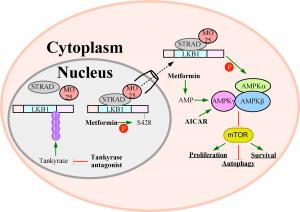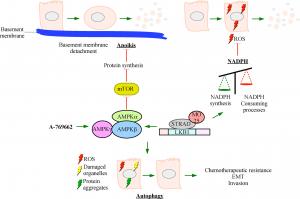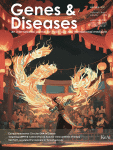
Figure 1. Tumor suppressing pathways of LKB1. The LKB1-AMPK-mTOR pathway suppresses tumor development. LKB1-AMPK disrupt mTOR activity leading to decreased survival and proliferation while increasing autophagy. Pharmacological compounds that activate the

Figure 2. Tumor promoting roles of LKB1. LKB1-STRAD-MO25 activity can promote tumorigenesis by increasing reactive oxygen species (ROS) scavenging NADPH. Given that ROS damage tumor cells, increasing NADPH in tumors protects these cells from ROS-mediated

Journal Cover
A new publication from Genes & Diseases; DOI 10.1016/j.gendis.2024.101402, discusses insights into targeting LKB1 in tumorigenesis.
CHONGQING, CHINA, December 20, 2024 /EINPresswire.com/ -- A new publication from Genes & Diseases; DOI 10.1016/j.gendis.2024.101402, discusses insights into targeting LKB1 in tumorigenesis.
Genetic alterations to serine-threonine kinase 11 (STK11) have been implicated in Peutz-Jeghers syndrome and tumorigenesis. Further exploration of the context-specific roles of liver kinase B1 (LKB1; encoded by STK11) observed that it regulates AMP-activated protein kinase (AMPK) and AMPK-related kinases.
Given that both migration and proliferation are enhanced with the loss of LKB1 activity combined with the prevalence of STK11 genetic alterations in cancer biopsies, LKB1 was marked as a tumor suppressor. However, the role of LKB1 in tumorigenesis is paradoxical as LKB1 activates autophagy and reactive oxygen species scavenging while dampening anoikis, which contribute to cancer cell survival.
Due to the pro-tumorigenic properties of LKB1, targeting LKB1 pathways is now relevant for cancer treatment. With the recent successes of targeting LKB1 signaling in research and clinical settings, and enhanced cytotoxicity of chemical compounds in LKB1-deficient tumors, there is now a need for LKB1 inhibitors. However, validating LKB1 inhibitors is challenging as LKB1 adaptor proteins, nucleocytoplasmic shuttling, and splice variants all manipulate LKB1 activity. Furthermore, STE-20-related kinase adaptor protein (STRAD) and mouse protein 25 dictate LKB1 cellular localization and kinase activity. For these reasons, prior to assessing the efficacy and potency of pharmacological candidates, the functional status of LKB1 needs to be defined.
This review article highlights the role of LKB1 in tumorigenesis and addresses the therapeutic relevancy of LKB1 inhibitors to improve the understanding of LKB1 in physiology and oncology.
Keywords: AMPK, LKB1, Peutz-Jeghers syndrome, STK11, Tumor suppressor
# # # # # #
Genes & Diseases publishes rigorously peer-reviewed and high quality original articles and authoritative reviews that focus on the molecular bases of human diseases. Emphasis is placed on hypothesis-driven, mechanistic studies relevant to pathogenesis and/or experimental therapeutics of human diseases. The journal has worldwide authorship, and a broad scope in basic and translational biomedical research of molecular biology, molecular genetics, and cell biology, including but not limited to cell proliferation and apoptosis, signal transduction, stem cell biology, developmental biology, gene regulation and epigenetics, cancer biology, immunity and infection, neuroscience, disease-specific animal models, gene and cell-based therapies, and regenerative medicine.
Scopus CiteScore: 7.3
Impact Factor: 6.9
# # # # # #
More information: https://www.keaipublishing.com/en/journals/genes-and-diseases/
Editorial Board: https://www.keaipublishing.com/en/journals/genes-and-diseases/editorial-board/
All issues and articles in press are available online in ScienceDirect (https://www.sciencedirect.com/journal/genes-and-diseases ).
Submissions to Genes & Disease may be made using Editorial Manager (https://www.editorialmanager.com/gendis/default.aspx ).
Print ISSN: 2352-4820
eISSN: 2352-3042
CN: 50-1221/R
Contact Us: editor@genesndiseases.com
X (formerly Twitter): @GenesNDiseases (https://x.com/GenesNDiseases )
# # # # # #
Charles B. Trelford, Trevor G. Shepherd, Insights into targeting LKB1 in tumorigenesis, Genes & Diseases, Volume 12, Issue 2, 2025, 101402, ISSN 2352-3042, https://doi.org/10.1016/j.gendis.2024.101402
Genes & Diseases Editorial Office
Genes & Diseases
+86 23 6571 4691
email us here
Legal Disclaimer:
EIN Presswire provides this news content "as is" without warranty of any kind. We do not accept any responsibility or liability for the accuracy, content, images, videos, licenses, completeness, legality, or reliability of the information contained in this article. If you have any complaints or copyright issues related to this article, kindly contact the author above.

